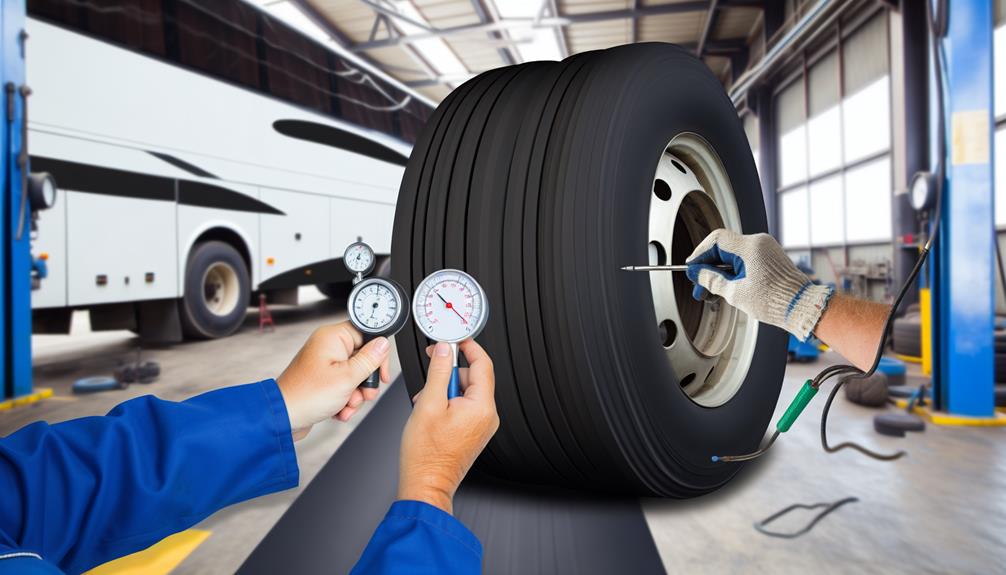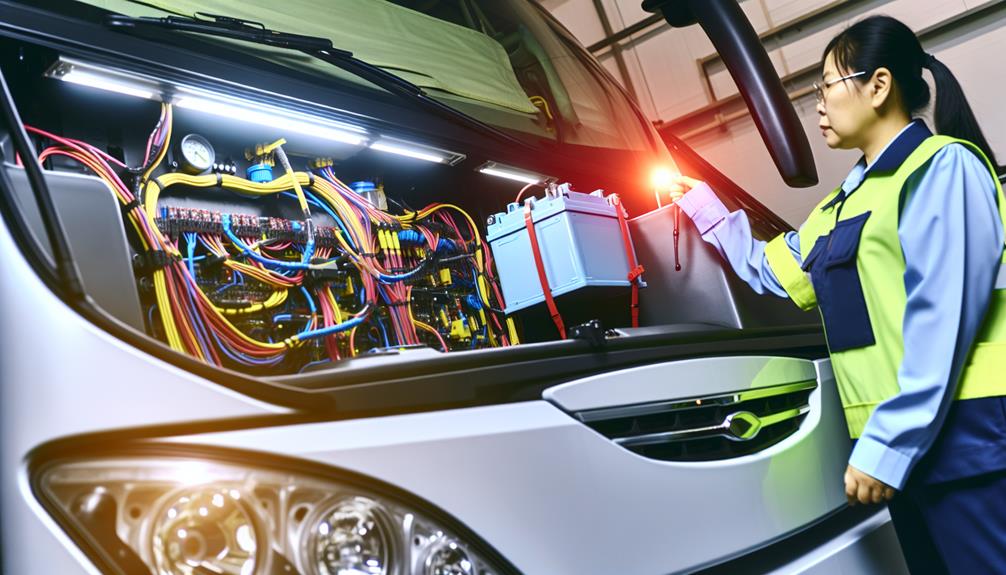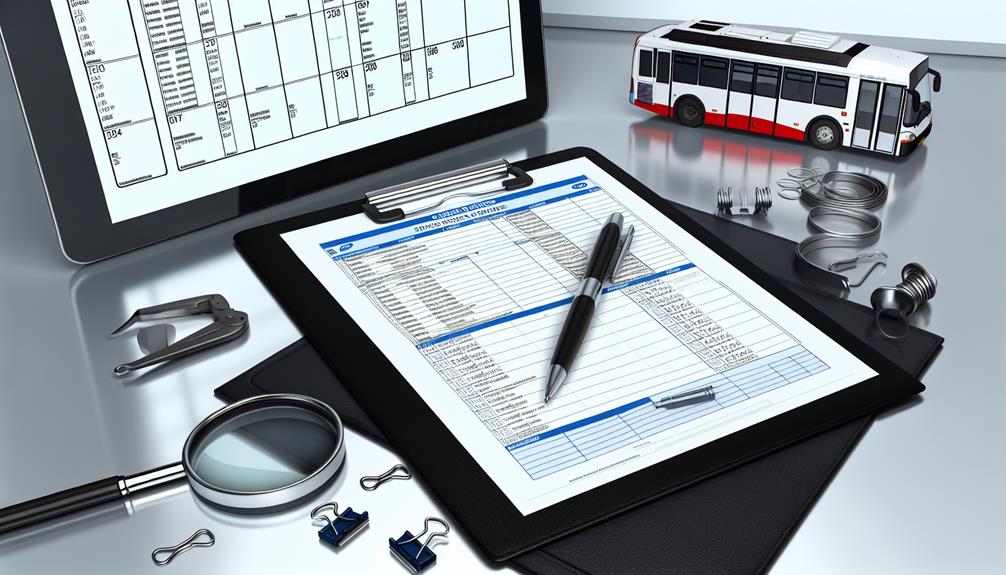Essential Tips for Reliable Coach Bus Care
When it comes to ensuring your coach bus operates safely and efficiently, you can't overlook the importance of regular maintenance. You should focus on key areas like inspections, fluid checks, and tire care to keep everything running smoothly. Maintaining detailed records isn't just a good practice; it can also help you anticipate future needs and manage budgets effectively. As you navigate the various aspects of bus care, you might wonder which maintenance tasks truly make the biggest difference in performance and safety. Let's explore those essential tips further.
Regular Inspection Routines

When you prioritize regular inspection routines for your coach bus, you not only enhance safety but also prolong the vehicle's lifespan. Establishing a consistent inspection frequency is essential for identifying potential issues before they escalate. Inspect critical safety equipment such as brakes, tires, and lights. This not only guarantees compliance with safety regulations but also fosters confidence in your vehicle's reliability.
During inspections, examine the condition of the safety equipment thoroughly. Look for wear and tear, proper functionality, and any signs of damage. Don't overlook the importance of the emergency exit mechanisms and fire extinguishers; these elements are fundamental for passenger safety.
Documenting each inspection helps create an accurate maintenance history, allowing you to track trends and address recurring issues. Aim for inspections at regular intervals—typically every 3,000 to 5,000 miles, depending on usage. This frequency may vary based on your operational demands, so adjust as necessary.
Essential Fluid Checks
Regular inspections set the stage for maintaining a coach bus, but they're only part of the equation. To guarantee your bus operates smoothly, you must perform essential fluid checks regularly. Start with engine oil, which lubricates critical components. Check the oil level using the dipstick and confirm it falls within the recommended range. Low oil levels can lead to severe engine damage.
Next, examine coolant levels. This fluid prevents overheating, so verify the reservoir is filled to the proper mark. Monitor the brake fluid as well; it's crucial for safe stopping. If the level's low, it could indicate a leak or worn brake components.
Don't forget about transmission fluid, which keeps the transmission functioning efficiently. Check its level and color; it should be a bright red. Any signs of brown or burnt fluid warrant immediate attention. Finally, inspect power steering fluid, confirming it's at the correct level to maintain ease of handling.
Tire Maintenance Best Practices

Proper tire maintenance is essential for guaranteeing safe and efficient operation of your coach bus. Regular attention to your tires not only enhances performance but also prolongs their lifespan. Here are some tire maintenance best practices to keep in mind:
- Check tread depth: Use a tread depth gauge to measure how much tread is left. A minimum of 4/32 inches is recommended for safety.
- Perform tire rotation: Rotate your tires every 5,000 to 8,000 miles to guarantee even wear. This practice helps in maintaining traction and extending the life of your tires.
- Monitor tire pressure: Check tire pressure at least once a month. Under-inflated or over-inflated tires can lead to uneven wear and decreased fuel efficiency.
Engine Care and Maintenance
While tire maintenance keeps your coach bus rolling smoothly, engine care is equally important for overall performance and reliability. Regularly check your engine oil levels and change the oil as specified in your owner's manual. Clean oil guarantees peak lubrication, enhancing fuel efficiency and prolonging engine life.
Make it a habit to inspect your air filter monthly. A clogged filter can restrict airflow, leading to reduced performance and increased fuel consumption. Replace it as needed to maintain top efficiency. Additionally, monitor your coolant levels and check for leaks, as overheating can cause severe engine damage.
Don't overlook engine diagnostics; utilize onboard diagnostic systems to identify potential issues early. These systems can alert you to problems before they escalate, saving you time and money in the long run. Regularly scan for error codes and address them promptly.
Lastly, keep your fuel system clean by using quality fuel and periodically adding fuel system cleaners. This will maintain peak combustion and further enhance fuel efficiency. By prioritizing these engine care practices, you'll guarantee your coach bus remains reliable, efficient, and ready for the freedom of the open road.
Electrical System Upkeep

To guarantee your coach bus operates efficiently, paying close attention to the electrical system is crucial. A well-maintained electrical system not only enhances performance but also guarantees safety and reliability for your travels. Here are three key areas to focus on:
- Battery Management: Regularly check your battery's charge level and connections. Clean terminals to prevent corrosion and replace batteries according to manufacturer recommendations to avoid unexpected breakdowns.
- Wiring Inspection: Routinely inspect the wiring throughout your bus for any signs of wear, fraying, or damage. Secure any loose connections and replace faulty wires immediately to prevent electrical failures.
- Fuses and Relays: Check the fuses and relays periodically. A blown fuse can disrupt your bus's electrical systems, so it's crucial to replace them promptly and guarantee the right amperage is used.
Brake System Monitoring
Keeping your brake system in top shape is essential for guaranteeing the safety and reliability of your coach bus. Regular brake system monitoring should be a non-negotiable part of your maintenance routine. Start by checking your brake pads frequently; worn pads can compromise braking efficiency, so plan for timely brake pad replacement when necessary.
Next, don't overlook the importance of brake fluid analysis. This analysis can reveal potential issues such as contamination or moisture buildup, which can greatly affect braking performance. Verify you're using the right type of brake fluid and maintain proper fluid levels.
Additionally, inspect the brake lines for any signs of wear or leaks. A thorough examination of the entire brake system, including rotors and calipers, will help you identify problems before they escalate.
Lastly, keep an eye on warning lights on your dashboard; they can indicate brake system malfunctions. By staying proactive and vigilant, you'll not only enhance the safety of your passengers but also extend the lifespan of your coach bus. Remember, a reliable brake system is your ticket to freedom on the road.
Interior and Exterior Cleaning

A clean coach bus not only enhances the aesthetic appeal but also contributes to the overall safety and comfort of your passengers. Regular interior and exterior cleaning is essential for maintaining your bus's condition and prolonging its lifespan. Here are three key areas to focus on:
- Upholstery Care: Regularly inspect and clean upholstery to prevent wear and tear. Use appropriate cleaners designed for the specific fabric, and always follow the manufacturer's instructions.
- Stain Removal: Address stains promptly to prevent them from setting in. Use a gentle cleaning solution, a soft cloth, and blot, don't rub, to lift the stain without damaging the fabric.
- Exterior Washing: Clean the exterior to remove dirt, grime, and road salt that can lead to corrosion. Use a pressure washer with a mild detergent, ensuring all areas, including undercarriage and windows, are thoroughly cleaned.
Seasonal Maintenance Checklist
Conducting a seasonal maintenance checklist is essential for guaranteeing your coach bus operates efficiently and safely throughout the year. To prepare for winter, start by inspecting the battery and verifying it's fully charged, as cold temperatures can affect performance. Check your antifreeze levels, and replace any worn wiper blades for ideal visibility. Don't forget to inspect tires for tread depth and proper inflation, important for traction on icy roads.
As summer approaches, focus on summer readiness. Inspect the air conditioning system; recharge it if necessary to keep passengers comfortable during hot weather. Examine fluid levels, including oil and brake fluid, and top them off as needed. Clean and check the radiator to prevent overheating, and verify the belts and hoses are in good condition to avoid breakdowns.
Additionally, inspect the exterior for any signs of rust or damage, and apply protective coatings if needed. By following this seasonal maintenance checklist, you'll enhance the reliability of your coach bus, guaranteeing smooth travels no matter the season. Regular maintenance not only guarantees safety but also gives you the freedom to enjoy the open road with confidence.
Record Keeping Importance

After ensuring your coach bus is in top shape with seasonal maintenance, maintaining accurate records becomes an essential part of your operational strategy. Record keeping isn't just a bureaucratic task; it's a tool for optimization, enabling you to make informed decisions that enhance your bus's performance and longevity.
Here's why effective record keeping is crucial:
- Maintenance Schedules: Keeping detailed logs helps you adhere to maintenance schedules, ensuring nothing falls through the cracks. You'll know when to perform routine checks, preventing costly breakdowns.
- Performance Tracking: Documenting performance metrics allows you to identify trends and anomalies. This insight helps in diagnosing issues early, before they escalate into major problems.
- Cost Management: Accurate records allow you to budget effectively and assess the financial impact of repairs and maintenance. You can evaluate which areas are consuming resources and adjust as necessary.
Professional Service Recommendations
Reliable professional service recommendations are important for maintaining the performance and safety of your coach bus. To guarantee ideal operation, it's essential to engage certified technicians who specialize in coach bus maintenance. They'll use diagnostic tools to assess engine performance, brakes, and suspension systems, addressing issues before they escalate.
Incorporating regular driver training programs is also significant. Well-trained drivers not only enhance safety but also improve fuel efficiency and reduce wear and tear on the vehicle. Implementing robust safety protocols guarantees that your drivers are well-versed in emergency procedures, vehicle operation, and passenger safety, contributing to a secure travel environment.
Additionally, schedule routine inspections to catch any potential problems early. These checks should cover crucial systems such as the electrical, hydraulic, and cooling systems, alongside tire conditions. Regular oil changes and fluid checks are fundamental to prevent breakdowns.
Lastly, maintain an open line of communication with your service provider. By doing so, you'll stay informed about best practices, recalls, and updates in safety regulations that affect your coach bus. Prioritize these recommendations to keep your vehicle running smoothly and safely on the road.
https://myprevost.net/wp-content/uploads/2024/09/728x90.jpg
